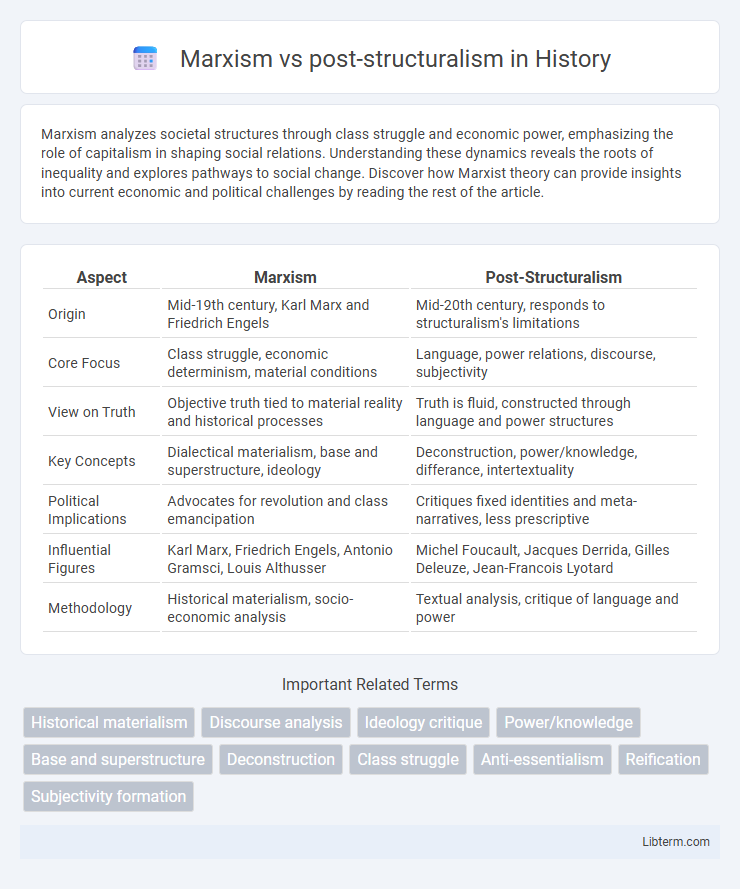Marxism analyzes societal structures through class struggle and economic power, emphasizing the role of capitalism in shaping social relations. Understanding these dynamics reveals the roots of inequality and explores pathways to social change. Discover how Marxist theory can provide insights into current economic and political challenges by reading the rest of the article.
Table of Comparison
| Aspect | Marxism | Post-Structuralism |
|---|---|---|
| Origin | Mid-19th century, Karl Marx and Friedrich Engels | Mid-20th century, responds to structuralism's limitations |
| Core Focus | Class struggle, economic determinism, material conditions | Language, power relations, discourse, subjectivity |
| View on Truth | Objective truth tied to material reality and historical processes | Truth is fluid, constructed through language and power structures |
| Key Concepts | Dialectical materialism, base and superstructure, ideology | Deconstruction, power/knowledge, differance, intertextuality |
| Political Implications | Advocates for revolution and class emancipation | Critiques fixed identities and meta-narratives, less prescriptive |
| Influential Figures | Karl Marx, Friedrich Engels, Antonio Gramsci, Louis Althusser | Michel Foucault, Jacques Derrida, Gilles Deleuze, Jean-Francois Lyotard |
| Methodology | Historical materialism, socio-economic analysis | Textual analysis, critique of language and power |
Introduction to Marxism and Post-Structuralism
Marxism centers on the analysis of class struggle, historical materialism, and the critique of capitalist modes of production as the driving forces of societal change. Post-structuralism challenges fixed meanings and grand narratives, emphasizing the fluidity of knowledge, language, and power relations through thinkers like Foucault and Derrida. While Marxism foregrounds economic structures and class relations, post-structuralism interrogates the construction of meaning and authority within social systems.
Historical Contexts and Intellectual Origins
Marxism emerged in the 19th century as a response to industrial capitalism, rooting its analysis in class struggle and economic determinants shaped by historical materialism. Post-structuralism developed in the mid-20th century as a critique of structuralism and grand narratives, influenced by the instability of meaning and the fragmentation of identity in postmodern societies. Key intellectual figures shaping post-structuralism include Foucault and Derrida, who challenged Marxist determinism by emphasizing power relations and language's role in constructing knowledge.
Core Principles of Marxism
Marxism centers on class struggle, historical materialism, and the analysis of capitalism as a system that perpetuates inequality and exploitation. It emphasizes material conditions and economic relations as the foundation for societal structures and power dynamics. In contrast, post-structuralism challenges fixed meanings and universal narratives, focusing on the instability of language, power relations, and subjective interpretations rather than economic determinism.
Foundational Ideas of Post-Structuralism
Post-structuralism challenges the fixed meanings and hierarchical structures emphasized in Marxism by rejecting universal truths and emphasizing the fluidity of language and power relations. Influential thinkers like Michel Foucault and Jacques Derrida argue that knowledge and reality are constructed through discourse, undermining Marxism's foundational premise of economic determinism and class struggle. This approach prioritizes the analysis of power dynamics, subjectivity, and the instability of meaning over Marxism's focus on material conditions and historical progress.
Differences in Understanding Power and Ideology
Marxism views power primarily as rooted in economic class relations and sees ideology as a tool used by the ruling class to maintain dominance and control over the proletariat. Post-structuralism, in contrast, understands power as diffuse, operating through discourses and social practices rather than centralized structures, and regards ideology as contingent, fragmented, and intertwined with language and knowledge systems. These differing perspectives affect how each theory analyzes social dynamics, with Marxism emphasizing economic structures and material conditions, while post-structuralism highlights the fluidity of power relations and the performative nature of meaning.
Approaches to Culture, Language, and Discourse
Marxism analyzes culture, language, and discourse primarily as expressions of material conditions and class struggles, emphasizing ideological control and economic power shaping societal narratives. Post-structuralism challenges fixed meanings and power dynamics embedded in language, highlighting fluidity, fragmentation, and the role of discourse in constructing social realities without assuming a singular truth. While Marxism foregrounds economic base shaping superstructure, post-structuralism critiques universal interpretations and promotes multiple readings influenced by power relations and context.
Materialism vs. Anti-Essentialism
Marxism centers on historical materialism, emphasizing economic structures and class relations as the foundation of societal change. Post-structuralism adopts anti-essentialism, rejecting fixed categories and highlighting the fluidity of identity and meaning shaped by language and discourse. This contrast frames Marxism's material determinism against post-structuralism's emphasis on the instability of social constructs and power dynamics.
Critiques Each Theory Makes of the Other
Marxism critiques post-structuralism for its rejection of objective social structures and economic determinism, arguing that it undermines the material basis of class struggle and revolutionary potential. Post-structuralism challenges Marxism's claims to universal truths and fixed identities, emphasizing the fluidity of power relations and the importance of language and discourse in shaping social realities. Both theories dispute each other's foundational premises, with Marxism focusing on economic conditions as primary drivers of history, while post-structuralism highlights the decentralized and contingent nature of power and knowledge.
Influence on Contemporary Social Theory
Marxism fundamentally shapes contemporary social theory by emphasizing class struggle, economic determinants, and material conditions as core to understanding societal dynamics. Post-structuralism challenges these foundations by deconstructing grand narratives and highlighting the fluidity of power, discourse, and identity beyond economic class alone. This ideological divergence enriches social theory with complex analyses of power relations, cultural practices, and subjective experiences in modern societies.
Conclusion: Ongoing Debates and Future Directions
Marxism and post-structuralism continue to generate critical debates centered on power structures, ideology, and social change, with Marxism emphasizing class struggle and economic determinism while post-structuralism challenges fixed meanings and grand narratives. Scholars increasingly explore hybrid frameworks that integrate Marxist materialist analysis with post-structuralist critiques of discourse and subjectivity to address complexities of contemporary society. Future research directions prioritize interdisciplinary approaches to analyze global capitalism, identity politics, and cultural hegemony in evolving socio-political contexts.
Marxism Infographic

 libterm.com
libterm.com